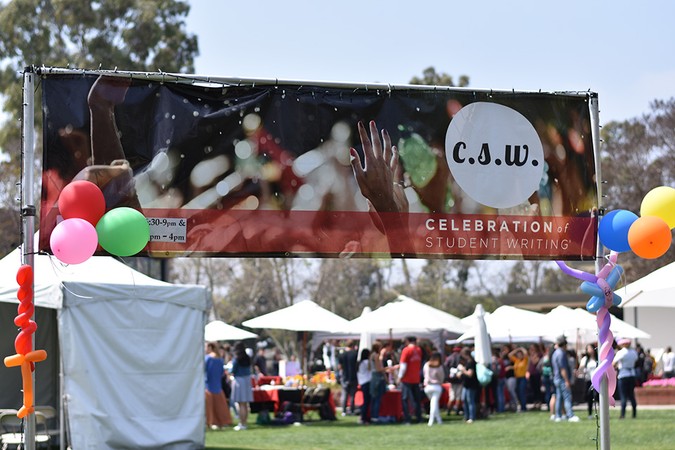Students should celebrate what they learn with creativity—or so the English department encourages through its Celebration of Student Writing event.
Aligning with the chapel theme of illumination, students had the opportunity to translate what they learned in their English 113 classes into creative projects that discussed an aspect of light.
LIGHT AND DARKNESS
Reflecting on literary symbols of light and dark, freshman cinema and media arts major Cole Williams wondered why darkness always portrayed the evil in narratives when God forged both darkness and light.
“God created light and darkness, he didn’t say that light is good, but night and darkness is bad. He said that they were both good,” Williams said. “Then I just asked myself, ‘Why is darkness considered so evil?’ And I think it’s because you associate light with certainty and comfortability and darkness with chaos and uncertainty.”
After brainstorming about projects that would depict this observation, he decided to write on a posterboard with two different colors of UV luminous ink. In one color, he wrote positive phrases, and in another, he wrote negative phrases. He then instructed his guests to look through red, cyan 3D glasses one eye at a time to see either the positive or negative phrases. With this demonstration, he challenged his viewers to rethink and contemplate their understanding of light and darkness.
“In English, even though you’re doing a lot of writing, to be honest, you don’t get to be creative that much because [when] you’re writing, you have to write about like a specific topic,” Williams said. “With this, it really let me be able to kind of branch out and be super creative and kind of just do something that I wanted to do and that I really was passionate about.”
DISTRACTIONS AND TECHNOLOGY
Freshman psychology major Brendyn Carpenter and his group felt inspired to focus their project around distractions, complete with a colorful poster board and meaningful discuss, after discussing technology in their English class earlier this semester.
“I constantly feel pulled to my phone, like before I go to bed at night I’m on it for maybe an hour. I could be getting sleep for that hour, but instead, I’m on my phone, and so it’s [an] unnecessary distraction when I could be given to much better things, like God. So that’s why we decided to do it,” Carpenter said.
Realizing the many distractions younger generations face with technology, homework and relationships, they wanted to refocus fellow students’ minds to the more important things of life, such as family, friends and God.
“We’re actually called to give our entire attention to God and just be with him at all times and it’s just we want to kind of put that in perspective and just bring it back around and show people that being distracted can be kind of avoided,” Carpenter said.
LOW SELF-ESTEEM IN LITERATURE
Sophomore public relations major Aubrey Dela Cruz and her group chose to examine self-esteem in literature. Realizing low self-esteem pervades much of literature, including fairytale characters, they dedicated their booth to combating low self-esteem.
“Literature really does affect society and kids that are reading it. You know, low self-esteem is something that, not only when you’re a kid reading, it affects you, but even like as a college student, a lot of people struggle with that,” Dela Cruz said.
They encouraged those who visited their booth to write kind words about either themselves or others on a mirror they provided or to write an encouraging note on stationary. In this way, they hoped to promote encouragement and self-confidence.
With all of the innovative ways the students applied the topic of illumination, they learned the value of transferring their learning into different mediums.
“It just kind of showed me that if I can have this kind of passion or try to be this creative even in those papers where it’s a little harder, then it’s just gonna turn out, you know, a lot better,” Williams said.
LESSONS IN DIFFERENT MEDIUMS
Both professors and students alike found the experience rewarding, as it is one of the only programs in the general education requirements that requires students to take their lessons outside of the classroom and transfer them into mediums that could apply to people of any major or interest.
“We want them to be able to take their writing and push it out into whatever major they have and whatever discipline and whatever other classes that they’re taking. So this is a way that they sort of take something that’s a little bit abstract, and it becomes a little bit more concrete in their minds,” said Christine Watson, interim co-director of the writing program. “It’s just meant to celebrate what they’ve done. They’re just supposed to have fun and say like, ‘We did some great work, and it’s awesome.’”







